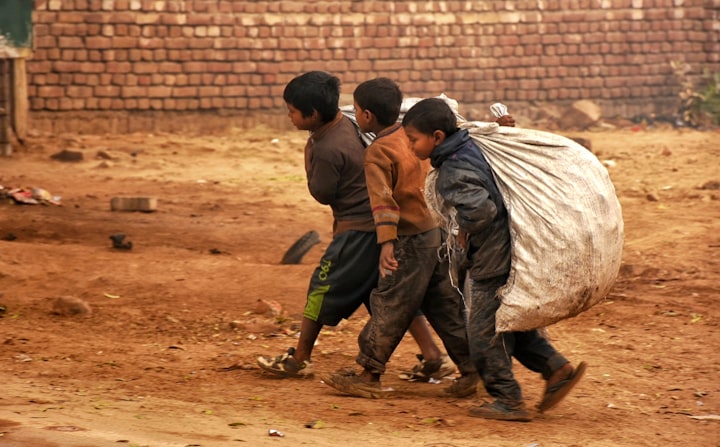
Introduction
Poverty is a deeply entrenched global issue that continues to afflict millions of individuals and communities worldwide. The poverty chain represents a cycle of disadvantage, where individuals and families find themselves trapped in a perpetual state of deprivation, lacking access to basic necessities, education, healthcare, and economic opportunities. Breaking the poverty chain is of paramount importance for several compelling reasons, ranging from ethical and humanitarian concerns to socio-economic, political, and environmental implications. In this essay, we will delve into the significance of breaking the poverty chain, exploring its multidimensional impacts on individuals, societies, and the broader global community.
Understanding the Poverty Chain
Before we delve into the importance of breaking the poverty chain, it is essential to comprehend its nature and complexity. The poverty chain is not a singular phenomenon but rather a web of interlinked factors that reinforce one another, making it challenging for individuals to escape its clutches. These factors include lack of access to quality education, limited healthcare services, inadequate housing, low-paying jobs, and discrimination based on gender, race, or ethnicity. Poverty also perpetuates itself across generations, as children born into impoverished families often face diminished opportunities, perpetuating the cycle.
Humanitarian Imperative:
The most fundamental reason for breaking the poverty chain lies in the basic humanitarian principle of respecting human dignity and ensuring the well-being of all individuals. Poverty robs people of their fundamental rights, such as access to food, shelter, education, and healthcare. Breaking the poverty chain is a moral obligation to alleviate human suffering and foster a more just and equitable society.
Economic Growth and Stability:
Poverty acts as a drag on economic growth and hinders the development of nations. When a significant proportion of the population lives in poverty, their potential contributions to the economy remain untapped. By breaking the poverty chain, nations can unlock the economic potential of their citizens, leading to increased productivity, innovation, and overall economic prosperity.
Reduced Inequality:
Persistent poverty exacerbates income and wealth inequality within societies. By breaking the poverty chain, we can bridge the gap between the rich and the poor, fostering greater social cohesion and stability. Addressing inequality not only benefits those directly affected by poverty but also contributes to the overall well-being of society.
Health and Well-being:
Poverty is closely linked to poor health outcomes and reduced life expectancy. Individuals living in poverty often lack access to adequate healthcare services, nutrition, and sanitation facilities, making them more vulnerable to diseases and preventable health conditions. Breaking the poverty chain would lead to healthier populations, reducing the burden on healthcare systems and increasing overall well-being.
Education and Empowerment:
Education is a powerful tool for empowerment and social mobility. However, poverty often denies individuals the opportunity to access quality education, perpetuating the cycle of disadvantage. Breaking the poverty chain involves investing in education and skill development programs, empowering individuals to make informed choices and improve their livelihoods.
Reduced Crime and Violence:
There is a strong correlation between poverty and crime rates. High levels of poverty can lead to desperation, frustration, and social unrest, increasing the likelihood of criminal activities. Breaking the poverty chain can help create safer communities and reduce the prevalence of violence.
Environmental Sustainability:
Poverty and environmental degradation are intertwined. Impoverished communities often resort to unsustainable practices, such as deforestation and overexploitation of natural resources, to meet their immediate needs. Breaking the poverty chain involves promoting sustainable practices and empowering communities to protect their environment for future generations.
Social and Political Stability:
Poverty can lead to social unrest and political instability. Addressing poverty is crucial for creating a stable and cohesive society. By providing opportunities for economic growth and social mobility, breaking the poverty chain can foster a more inclusive and politically stable environment.
Global Impact:
Poverty is not limited to specific regions; it is a global issue. Breaking the poverty chain is essential for achieving the United Nations' Sustainable Development Goals (SDGs), which aim to eradicate poverty and promote prosperity for all. Additionally, poverty alleviation can enhance global cooperation and reduce the potential for conflict arising from disparities between wealthy and impoverished nations.
Interconnected Challenges:
The poverty chain is closely linked to various other global challenges, such as hunger, malnutrition, lack of clean water, and inadequate sanitation. By breaking the poverty chain, progress can be made on multiple fronts simultaneously, making it easier to address other interconnected challenges.
Conclusion
Breaking the poverty chain is a monumental task that requires concerted efforts from governments, non-governmental organizations, businesses, and individuals. By recognizing the importance of breaking this cycle of disadvantage, we can collectively work towards creating a more equitable, sustainable, and prosperous world. Addressing poverty is not just a matter of altruism; it is a pragmatic step towards ensuring the well-being of current and future generations and building a more resilient global community. As we strive to break the poverty chain, we must remain committed to implementing comprehensive and innovative solutions that empower individuals and uplift communities from the depths of poverty to the heights of dignity and opportunity





Comments
There are no comments for this story
Be the first to respond and start the conversation.